Contents
What does the owner want from the chickens? Of course, a lot of eggs from laying hens, and meat from broilers. To achieve the desired result, the poultry house must be kept clean. But this alone is not enough. It is important to think about the ventilation of the room. Otherwise, the air inside the chicken coop will be stale, especially in winter, which will adversely affect the health of the birds. Now we will look at how to make ventilation in the chicken coop with our own hands, and also find out what its varieties are.
Why is ventilation needed in a chicken coop?
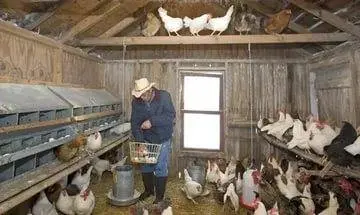
Ventilation in the poultry house provides air exchange, that is, bad air comes out of the chicken coop, and clean air enters. Let’s see why this is necessary:
- Chicken manure releases a lot of ammonia. An unpleasant odor spreading throughout the poultry house is only half the trouble. Ammonia vapors are harmful to the body of chickens, and can even cause poisoning. A particularly large accumulation of vapors is observed in severe winters, when the owner tightly closes all the loopholes of the poultry house.
- With the help of ventilation in the chicken coop, the required temperature regime is set. In the hot summer, there is stuffiness inside the house, from which the chickens also suffer. The influx of fresh air discharges the atmosphere, making it comfortable for the birds.
- Ventilation of the chicken coop allows you to control the humidity of the air inside the room. Too dry air is unacceptable for the chicken, as well as raw. A high concentration of moisture is observed in winter. It is excreted from the litter, and also evaporates from the drinkers. Dryness prevails in hot summers. Ventilation provides a normal balance in the atmosphere, which has a positive effect on the health of chickens.
If you have already decided to go into poultry farming, you won’t get good results without arranging the hood in the chicken coop.
On the video ventilation for the poultry house:
What should a poultry farmer know about ventilation?
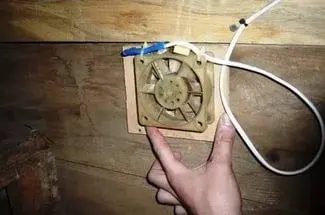
In order for the installed ventilation in the chicken coop to work effectively with your own hands, you need to take into account several important nuances:
- The volume of clean air should be enough for all birds. The more chickens are kept, the more fresh air is required. You can achieve the best result by choosing the right section of air ducts, as well as their number.
- So that the ventilation in the chicken coop in winter does not cause the birds to freeze, the system must be made adjustable. To do this, all air ducts are equipped with dampers, which allow fresh air to be supplied in portions during the cold season.
- Ventilation should change the air inside the coop, but keep it warm. In winter, the supply air ducts are covered with a mesh with very small cells. In severe frosts, the inflow is completely covered.
If all these nuances are taken into account when installing ventilation, the purity of the indoor air will be guaranteed.
Three ways to organize ventilation inside the house
In general, ventilation is divided into two types: natural and forced. There are three ways to organize it inside the house.
Ventilation
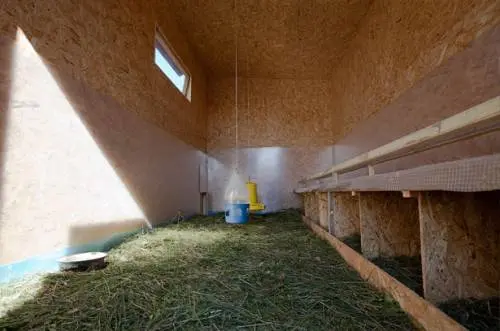
Such a ventilation device in the chicken coop is considered the simplest. Ventilation refers to the natural type of ventilation, and does not require the installation of any air ducts. Air exchange occurs through open windows and doors. To do this, even at the stage of building a poultry house, a small ventilation window is provided in the ceiling or above the door.
Ventilation is effective only for small rooms, and even then not always. In winter, cold air will flow in large volumes through an open window and door. The poultry house will quickly cool down, which is why it will have to be heated more often.
Supply and exhaust system
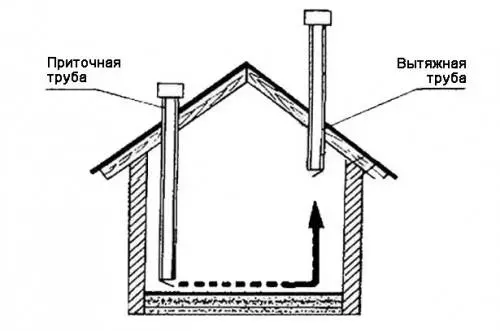
The most efficient and budgetary for the poultry house is the supply and exhaust system. It also refers to natural ventilation, but is equipped with the installation of air ducts. The photo shows a diagram of the supply and exhaust system. As you can see, ventilation consists of at least two pipes. The exhaust air duct is installed under the ceiling, and taken out on the street above the ridge. The supply pipe on the street is led out above the roof to a maximum of 40 cm. Indoors, the air duct is lowered to the floors, but not closer than 30 cm.
The hood is placed closer to the feeders or perches in order to effectively remove unpleasant odors. It is impossible to install supply pipes above a place where chickens often sit. From the draft, the birds will constantly catch colds and get sick.
In a domestic chicken coop, plastic pipes are used to make air ducts. For a small poultry house, channels with a cross section of 100 mm are enough. A large poultry house will need several of these pipes. To make an extract with a minimum violation of the integrity of the roof, it is better to use air ducts with a larger cross section, say, 200 mm.
Mechanical extractor
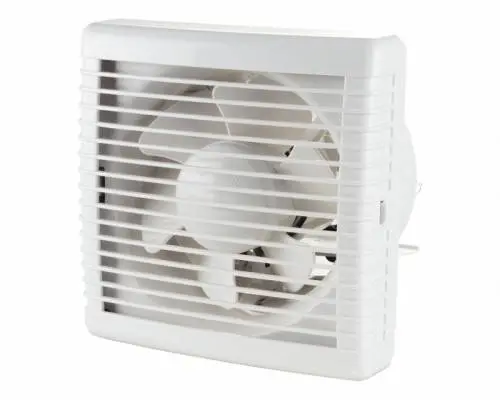
Forced ventilation is called mechanical not because mechanisms are used in the system, but due to a large number of sensors. They are installed throughout the chicken coop to control humidity. The system itself is similar to supply and exhaust ventilation, only the air ducts are equipped with electric fans. If desired, the channels can be equipped with dampers that work in conjunction with sensors. They will open and close on their own as needed.
Building such a system at home is a costly business, and it is simply not needed. Forced ventilation is installed on large poultry farms, where the natural system cannot cope with air exchange. If you really want to make mechanical ventilation for the poultry house, then you can install a fan in the window. But here you have to be prepared to pay more for electricity.
The video will tell about the mistakes of poultry farmers when organizing the hood:
Self-installation of ventilation
It makes no sense to consider in detail the method of ventilation, since a great mind is not required to open doors and windows. Now we will learn how to properly make a supply and exhaust and mechanical system.
Independent production of a supply and exhaust system for a poultry house
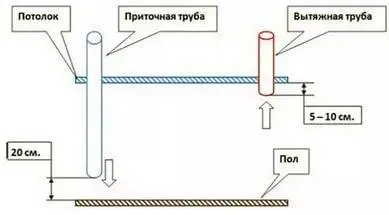
The supply and exhaust system is able to provide high-quality air exchange in winter and summer, so it is ideal for a home chicken coop.
So, let’s start installing the ducts:
- To install the ventilation duct, you will need a pair of plastic pipes. In order not to be mistaken with the cross section, we will take them with a diameter of 200 mm, and to adjust the air flow, it is better to put dampers. We buy pipes 2 m long. This is enough to raise the air duct above the roof and lower it inside the chicken coop.
- In the roof under the two air ducts, we cut holes with a jigsaw. We lower one end of the exhaust pipe 20 cm below the ceiling, and bring the other end of the air duct 1,5 m above the roof. We lower the supply pipe through the hole in the roof to the floor itself, making a gap of 20–30 cm. Above the roof, we leave an exit 30–40 cm long.
- In order for the ventilation made to be airtight, you need to buy two passage nodes in the store. With the help of them we fasten the pipes to the roofing. From above, we put on protective caps on the air ducts, and from below, with the help of plastic plugs, we adapt dampers.
That’s all, the system is ready. To avoid the formation of condensation in the air ducts in winter, pipes from the street can be insulated.
Self-assembly of the mechanical system
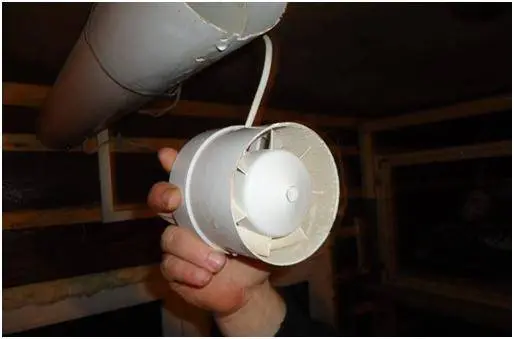
We have considered one of the ways of arranging forced ventilation in a domestic chicken coop. It provides for the installation of a fan in the window. A more efficient system can be done differently. First, a supply and exhaust system is made in the chicken coop. Next, it remains to buy a round fan and fix it inside the pipe. You can control its operation through a conventional switch mounted on the wall of the chicken coop.
The video shows the ventilation of the chicken coop:
Conclusion
Ventilation for a home chicken coop can be done in any of the ways considered, but it is absolutely necessary, and you can’t argue with that.









